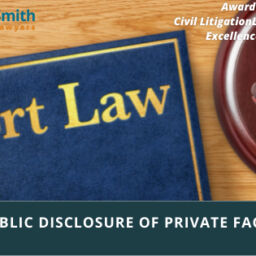E-torts: Defamation on the Internet – 8 Things You Need to Know About Internet Defamation in Alberta
People say awful and untruthful things about other people. It’s been going on since the dawn of humankind. But the effects of this kind of speech have increased exponentially with the rise of the internet and social media. With over 25 million social media users in Canada, internet defamation is inevitable.
 Defamation law has been in place long before the internet was conceived. But because of the changes brought on by the internet, defamation law continues to evolve in an effort to balance the right to free expression with the right to protection against unfair attack on one’s reputation.
Defamation law has been in place long before the internet was conceived. But because of the changes brought on by the internet, defamation law continues to evolve in an effort to balance the right to free expression with the right to protection against unfair attack on one’s reputation.
This post serves as a thorough overview of internet defamation in Alberta. If you’ve been impacted in some way by defamation on the internet, you’ll learn what your legal options are.
What Is Defamation?
Defamation is simply a false statement that damages the reputation of another party. This statement must be made to a third party to qualify as defamation. It can be either libel or slander, and it can be a statement made about a person, business, organization, group, nation, or product.
Libel is defamation that involves a permanent record, such as email, social media posts, online reviews, a newspaper article, or a radio broadcast. Cyber-libel specifically refers to internet defamation, an untrue statement posted online or sent via email that damages the reputation of another party. Slander is defamation without a permanent record, such as an oral statement or a hand gesture.
Defamation law in Alberta is not about protecting pride. A person has the right to free expression, even to leave an honest negative online review after doing business with you. But defamation law protects your reputation and offers restitution for those whose reputation has been damaged by defamation.
So, a person has a right to say whatever they want, but they may have to pay damages if their statement defames the party their message was about.
How to Prove Defamation in Alberta
Defamation law varies from province to province. In Alberta, legislation on defamation is found in the Alberta Defamation Act. This Act defines defamation, including the scope of defamatory statements, details the damages a defamed party can recover, and sets out possible defences an accused party can raise.
In a case of libel, you are not required to prove that you suffered damages, but you must prove that an untrue statement was made about you to a third party. In a case of slander, however, you must prove that damages were suffered.
Proving defamation is not easy. Alberta law determines a statement defamatory if it damaged a party’s reputation. It must be proven that an “ordinary reasonable person” would consider the statement defamatory.
The court takes into account the circumstances of the case including the:
- audience,
- manner in which the statement was presented,
- context, and
- any reasonable implications of the statement in question.
The plaintiff (the party presenting the case to the court) carries the burden of demonstrating the statement was defamatory as a matter of fact.
Should You Initiate a Lawsuit for Defamation?
If you or your business has experienced damage to your reputation as a result of internet defamation, taking legal action is an option for you. However, there are a few things to consider before you decide to initiate a lawsuit.
Timing
In Alberta, the Limitations Act allows a period of 2 years from the date the defamatory statement was first made or published on the internet. If it’s still within that period, you could potentially sue.
Value
A lawsuit takes time and costs money. Unless the defamation caused significant financial damage, it might not be worth pursuing legal action. If you can clearly quantify the damages, there’s a better chance a court may award you accordingly.
The size of a general damages award is dependent on several factors, including:
- How far-reaching the publication of the defamatory statement was,
- The effect of the defamatory statement on the reputation of the defamed party, and
- The quantifiable losses to the defamed party because of the defamatory statement.
Under the Criminal Code of Canada, a person who is convicted of defamatory libel could face up to 2 years’ imprisonment.
8 Most Common Defences in a Defamation Lawsuit
If you are accused of internet defamation or if you are suing someone else for internet defamation, it’s helpful to know what the most common defences are.
1. Statement of Fact
Just because a statement damages a reputation doesn’t automatically make it defamatory. A factual, true statement is a good defence.
2. Minor Error
Defamation cases are decided based on fact. A common defence is to pinpoint minor errors in an allegedly defamatory statement.
3. Fair Comment / Opinion
On issues of public interest, individuals are free to comment and express an opinion as long as their comments are:
- Statements of opinion, not fact;
- Based on facts that can be proven; and
- Not with malicious intent.
This defence protects online reviewers, for example.
4. Privilege (Absolute or Qualified)
Qualified privilege is a defence for those who make a statement that could be considered defamatory but are honest and well-meaning. An example of this is a reference person truthfully telling a potential employer about problems with the prospective employee.
Absolute privilege protects people who must make statements in Parliament, as evidence at a trial or in court documents or in a criminal or civil case, or to a quasi-judicial body such as a regulatory professional association.
5. Limitation Periods
As stated above, Alberta law requires a claim for internet defamation to be filed within2 years of the defamatory statement’s publication. However, there are some situations that allow this period to be extended up to 10 years. The timing could provide a defence in some cases.
6. Innocent dissemination
To disseminate is to spread. If a party spreads a defamatory statement without realizing that it was defamatory, and if they remove the statement when they become aware of its nature, this is a reliable defence for them.
7. Responsible communication on matters of public interest
This defence is for libel cases and is intended to protect journalists (which includes online publications such as blogs). It allows journalists to make statements – even untrue statements – if it’s a matter of public interest with a sense of urgency, seriousness, and public importance. The journalist must have used reliable sources and attempted to report on both sides of the issue.
8. Apology
While apologizing for making a defamatory statement is not a clear defence, it can lessen the damages the court might order against the party that made the statement.
3 Important Things You Need to Know Before Suing for Defamation
If you decide to take the matter to court, here are 3 important things you should know about suing for internet defamation.
1. Know Your Court Jurisdiction
In Alberta, internet defamation cases are typically dealt with in civil courts, but the option is sometimes given to take the case to Small Claims Court or the Alberta Court of Queen’s Bench.
Your claim must be for $25,000 or less in Small Claims Court in Alberta. If you’re willing to settle for a smaller amount of money, this option could save you significant time, hassle and money.
Alberta Court of Queen’s Bench might be a better option for you if you’re going after a large award, or you need the defamatory statements to be removed or stopped.
2. Know What You’re Likely to Get Out of Court
Consider the time, energy, and money that goes into a court case. Understand the odds of your desired outcome before you go to court.
In Small Claims Court, the outcome is usually money, though it’s usually not more than the maximum limit of $25,000. The Alberta Court of Queen’s Bench has no limit on money claims, but it also has the power to stop the defamatory statements.
Keep in mind that, even if a court awards you damages, some defendants could be “judgment proof”, meaning they simply don’t have the money or assets to give you.
3. Know You Can Successfully Prove Defamation with Evidence
No matter how compelling your legal argument, you won’t get anywhere without hard evidence. You must gather every tangible proof you can for the internet defamation. Together with your lawyer, you can assess your evidence to determine your odds of winning the case.
How to Combat Internet Defamation Without Going to Court
Going to court for internet defamation might not be the best course of action for you. Here are a few other options you might want to consider instead. You never know – the other party might be reasonable enough to respond favorably to one of these actions.
Write Your Own Takedown Demand Letter
Write a letter to both the party who posted the defamatory statement and the service provider hosting the content. Send it via snail mail if you have a physical address, as well as by email.
Start by affirming freedom of speech, then clearly detail how the published statement is defamatory. Explain how the statement has affected you and state that it is their duty to take the statement down. Close with a polite explanation about the consequences of not complying with your request.
Hire a Lawyer to Write a Takedown Demand Letter
A letter from a lawyer can carry more weight for some people, so it can be more effective than a letter from yourself. This will cost you more money than doing it yourself, but you’ll have the advantage of the lawyer’s expertise and experience – not only with internet defamation and the law in general, but also with the writing itself.
Make a Complaint to the Police
Sometimes the police are willing to act on a criminal harassment complaint. Even if they’re not comfortable laying a charge because they don’t feel they have enough evidence, they might be willing to contact the party who made the defamatory statement. Most people pay attention when the police call them on an issue.
Defamation Lawyers In Calgary, Alberta
Internet defamation in Canada is a real and costly issue. If you’re a victim of internet defamation or if you’ve been accused of internet defamation, the defamation lawyers at Osuji & Smith in Calgary, Alberta can help. Let us review your case, help you determine if you have enough evidence to sue, or work with you to resolve the issue outside of court. Contact us today.



